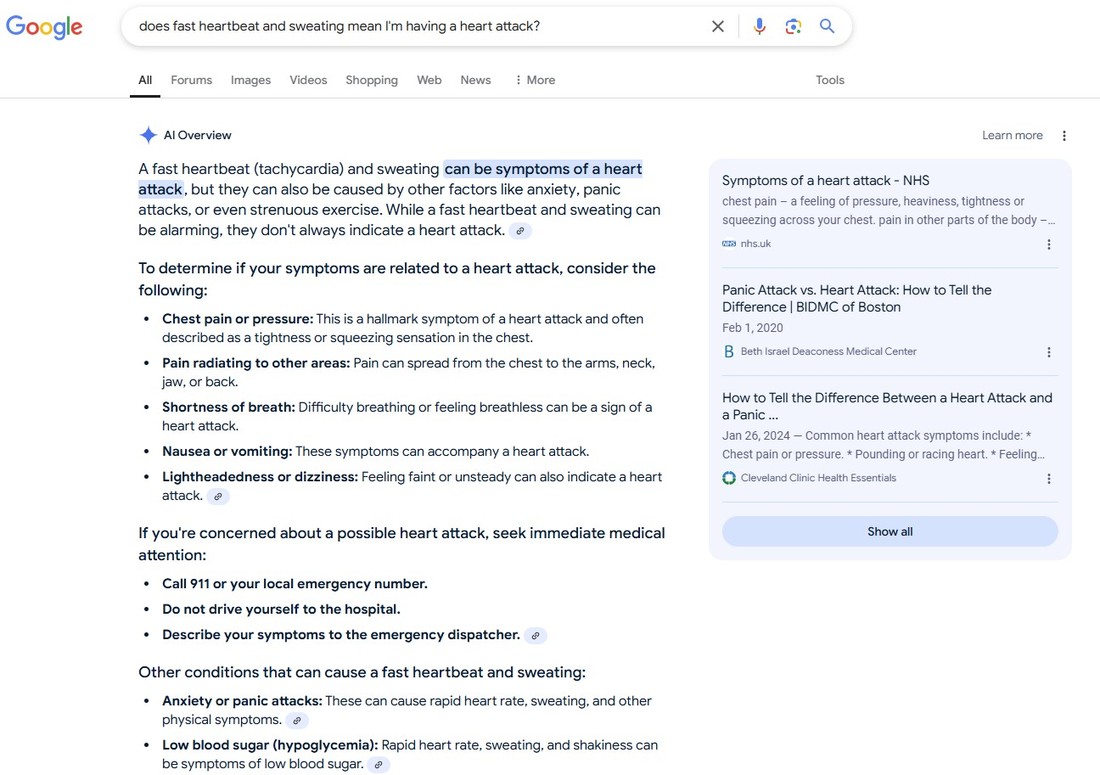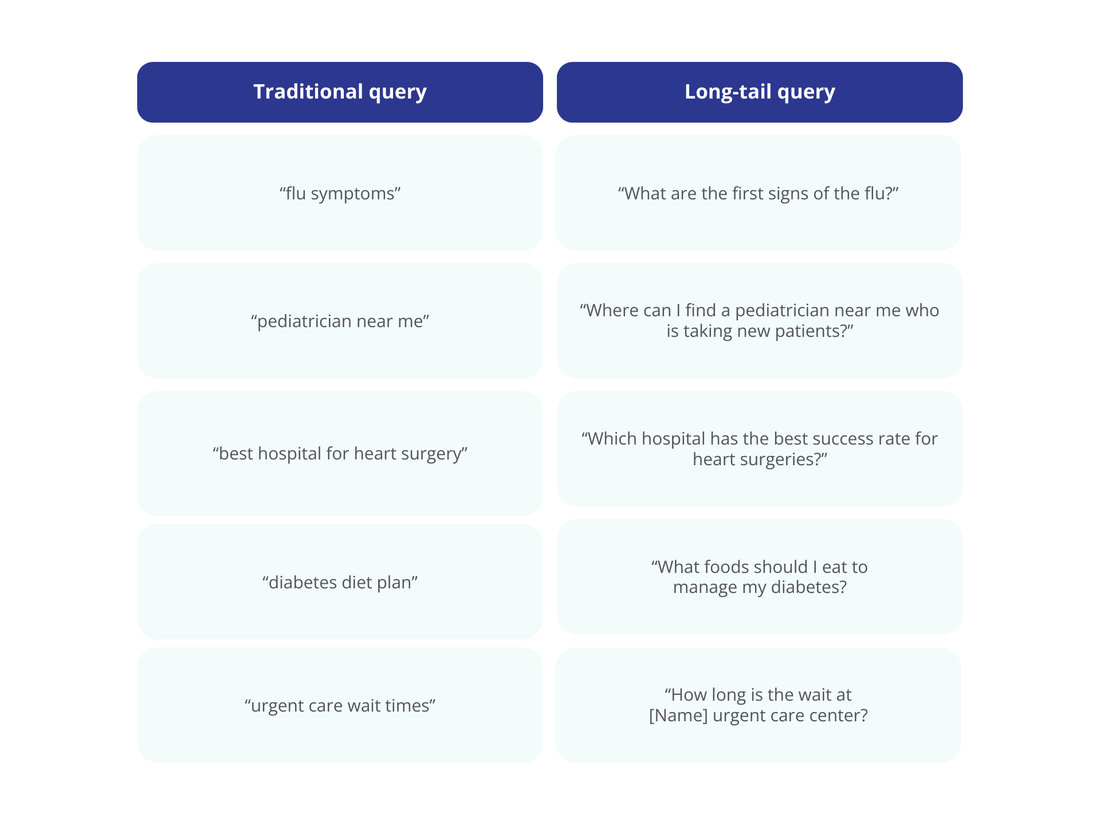
Patient-centered marketing is about meeting patients where they are: answering their questions, alleviating their fears, and giving them the right information at the right time.
To do that, you have to know where they’re looking for this information and how to show up in those places. Hint: It’s not just Google, and it’s not yesterday’s SEO strategies.
People search differently now than they used to, and — you guessed it — AI is to blame. Before adapting your strategy to this new search landscape, get the lay of the land.
“Consumer search behavior” describes how people search for information, products, or services. 100 years ago, the “search” process happened through conversations, newspapers, and at local markets. Today, it mostly happens online.
Searching online has become our second nature, almost like it was coded into our DNA. It’s a habit as automatic as grabbing a snack. You do it on autopilot and then find yourself staring at the same fridge contents you just took stock of 15 minutes ago. (“What did I go to the kitchen for, again?” you ask.)
Once people started “surfing the web,” this routine became ritual:
Opportunistic search engine companies studied consumer search habits to improve their product’s design. Opportunistic marketers studied search behaviors to gain the advantage over competitor websites.
Thus, SEO was born. And reborn … again and again, year after year, as search behaviors continued to adapt.
This will come as no surprise to a seasoned marketer like you, but search is (once again) entering a new era.
Dig in deeperWhile we’re on the topic, grab our all-encompassing guide to SEO for healthcare marketing. |
Search has changed tremendously over the years. But her biggest transformation is happening right now.
AI’s widespread adoption is changing where and how people search for information.
Google’s brand is so synonymous with online search that its name has become a verb. “Let me Google it” is a sentence, though it shouldn’t be.
Google was (almost) everyone’s go-to search engine, aside from those people who were wisely concerned about cookie tracking. (They were ahead of their time.)
Now, thanks to AI, the pool of options is deeper. Consumers don’t have to rely on organic rankings to get queries answered. They can also look to:
… among a swath of other platforms and search engines.
What does this mean for healthcare marketers? Patients are using AI Overviews, SearchGPT, and other new tools for healthcare-focused searches. Generative engine optimization (GEO) should be on your radar.

How else are search behaviors changing? Let’s look at the trends.
Historically, search queries were as short as possible. Queries were often written as phrases without linking words, like “heart attack signs.”
Now, people are getting accustomed to the back-and-forth nature of chatting with AI assistants. Search behaviors on Google (and other platforms) are following suit.
Queries are becoming:
For example, instead of “heart attack signs,” we’re moving toward searches like “how do I know if I’m having a heart attack?” or “does fast heartbeat and sweating mean I’m having a heart attack?”

Tactics for today’s searchWondering how to respond to these shifts in patient search patterns? Add these AI search optimization strategies to your toolbelt. |
The rise of AI content (including AI-generated answers) doesn’t only affect how patients search. It affects how they feel about digital writing and the brands that produce it.
People feel bombarded by misinformation. And they notice when it sounds like content was slapped together by AI. Some of them are getting annoyed by the invasiveness of it all — it’s not fun having to dredge through the AI muck to get to a reliable answer.
The effect is compounded in healthcare. With more and more large media brands openly using AI for content production (like BuzzFeed), it’s hard for people to trust that they’re reading well-researched and accurate information.
How can healthcare marketers overcome patients’ understandable skepticism? With content that bolsters their brand’s online authority (and, as a result, builds trust).
Stand out from AI-generated answers with authoritative healthcare content:
Beyond that, ensure your healthcare content is accurate, as always. Cite your sources, ask a physician to vet the information, and return to the content regularly to ensure the information is still current.
AI is not the enemy — misinformation is. Show patients that they can still rely on your brand to meet them where they are with trustworthy, authoritative health content.
Are you showing up in all the places patients search? Understand your search performance and optimize it with our AI Search Visibility Performance Report.
We’re on a mission to deliver clear healthcare content to your readers. As a healthcare marketer, you are constantly detangling the complex web of content challenges. We can help by creating strat... Read more
What Did You Learn? Episode 8As much as you can plan for a pandemic or any communications crisis, living through it is a different story.But pre-planning and having fluid relationships ...read more
What Did You Learn? Episode 5The ability to shift gears in a moment’s notice is crucial for successful healthcare communicators. That’s one lesson Lauren Smith, manager ...read more
Everyone seems to be on TikTok, whether it’s teens seeking the latest fashions or older adults living their best lives. This social media platform is *the* place to share video ...read more
This is a guest post from Jen Brass Jenkins, Web Content Writer for University of Utah Health. She’s sharing her experience as a healthcare marketer amid COVID-19.I woke ...read more